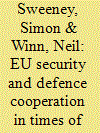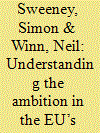| Srl | Item |
| 1 |
ID:
173160


|
|
|
|
|
| Summary/Abstract |
Has the United Kingdom(UK) Brexit referendum been a catalyst for more European Union security cooperation? How significant are post-referendum initiatives in security and defence? What are the implications of Brexit for European Union (EU) and UK security and defence? This article analyses EU post-Brexit strategic choices following the launch of the EU Global Strategy (2016). EU autonomy in security and defence requires close cooperation with third countries, including Norway and post-Brexit UK. It remains to be seen whether the EU and the UK can forge a new bespoke security and defence relationship that delivers mutual benefits through shared strategic ambitions, while also protecting their various interests. We suggest there will be serious collateral damage to UK-EU security and defence cooperation if post-Brexit trade negotiations descend into acrimony and mistrust, especially in the event of “no-deal” once the “transition period” ends. This would undermine European security and the EU’s quest for strategic autonomy in world affairs and have serious implications for both UK and EU security. We conclude that the EU needs to work with the UK on a plan to achieve global strategic autonomy, or both risk reduced influence in the wider world in the years ahead.
|
|
|
|
|
|
|
|
|
|
|
|
|
|
|
|
| 2 |
ID:
185345


|
|
|
|
|
| Summary/Abstract |
The quest for substance, capability, and strategic autonomy goes on – or does it? Is the objective of CSDP territorial defence and strategic autonomy, or crisis management and softer security concerns like peacekeeping, border management, protection of shipping lanes, and/or cyber security? The Union needs to move beyond familiar complaints about the lack of common strategic culture and EU intrusion into NATO responsibilities. Geostrategic and economic imperatives dictate that the EU should progress CSDP beyond civilian crisis management in the EU Neighbourhood, and military training and security sector reform (SSR). The Strategic Compass must signal CSDP clarity of objectives, coherence, enhanced capability, and appropriate burden sharing with NATO. The response to the Strategic Compass must build European strategic autonomy in ways that strengthen NATO. For military strategic and economic reasons, both the EU and the post-Brexit UK need intensive cooperation to maintain their geostrategic relevance and strengthen the NATO alliance. This paper reflects on prospects for the EU Strategic Compass and offers timely analysis of recent trends in EU foreign and security policy and expresses cautious optimism regarding the enhanced European strategic autonomy/actorness.
|
|
|
|
|
|
|
|
|
|
|
|
|
|
|
|